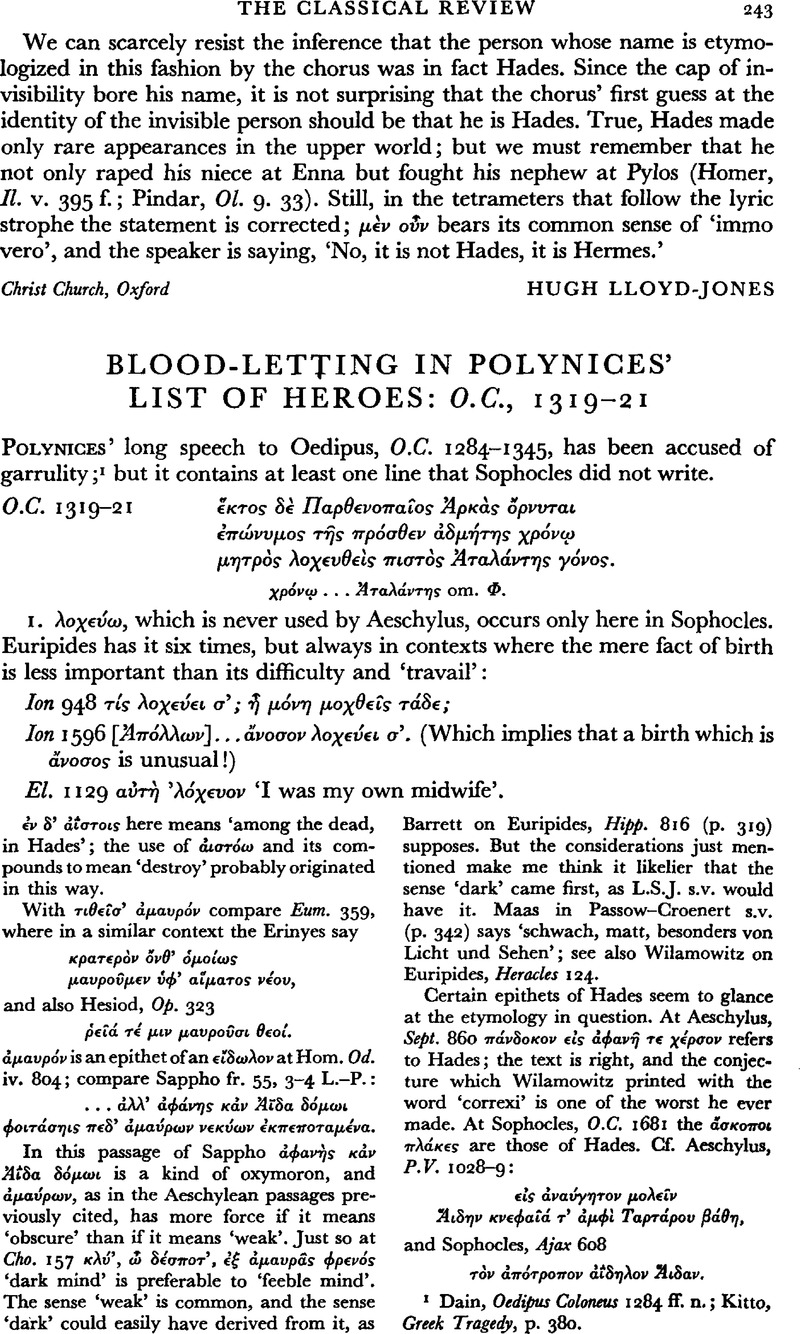No CrossRef data available.
Published online by Cambridge University Press: 27 February 2009

page 243 note 1 Dain, , Oedipus Coloneus 1284 ff. n.;Google ScholarKitto, , Greek Tragedy, p. 380.Google Scholar
page 243 note 2 Iliad vi. 395–7.
page 243 note 3 The attribution of the remark to Andromache (Murray) is better than Seidler's attribution to Hecuba:ἐλοχεύθην could not mean ‘where I was born’ in Hecuba's case (on her parentage see Pherecydes, cited by Jacoby, Fr. d. Gr. Historiker i. 136); nor could it mean ‘where I was delivered of my children’ because of the aorist. Hecuba bore nineteen of Priam's fifty sons, Iliad xxiv. 495–7.
page 243 note 3 She has no real mother: Hesiod, Theog. 886–900; Pindar, Olymp. 7. 34 ff.
page 243 note 4 Note that (painful) fire is the obstetric agent here and in the birth of Semele; δεινὸν γυναιξὶν αἱ δι᾽ ὠδίνων γοναί(Eur. Phoen. 355).
page 245 note 1 Just as in Latin verus never means fidus. See Shackleton Bailey, Propertiana, on Prop. ii. 29. 33.
page 245 note 2 (a) Theopompus Comicusfr. 32 Κπιστ ὸν τέκνον is clearly a pun on the meaning of πιστ ὸς ‘drinkable’ as the child addressed is a Thericlean cup.
(b) LXX De. 28. 59 νόσοι πονηραὶ καὶ πισταί (‘unmistakable’, L.S.J.) is translated in the Vulgate infirmitates pessumae etperpetuae. The equivalence of perpetuae and moral seems to depend on a nuance of Hebrew idiom; I am not able to say what this is, but clearly πισταίdoes not simply mean ‘true’ in this context.
page 245 note 3 Eur. Phoen. 283 οἱδίπου κλεινὸς γόνος, etc.
page 245 note 4 οἶος δορυσσοῦς Ἀνφιάρεως: only the hero has an adjective at all; the other heroes are qualified by their genealogies alone.
page 245 note 5 Was Parthenopaeus the son of the Argive Talaus, or of the Arcadian Atalante? The traces of this controversy are summarized by Masqueray at Phoen. 1153, to which add Σ in O.C. 1320, ἔνιοί φασιν οὐ Ἀταλάντης Παρθενοπαῖον στρατεῦσαι, ἀλλὰ τὸν Ταλαοῦ, ὃν ἔνιοι διὰ τὸ ![]() Καλαὸν προσαγορεύουσι,κάθαπερ Ἀρίσταρχος ὁ Τεγεάτης καὶ Φιλοκλῆς, συγγραφέων δὲ῾Εκαταῖος ὁ Μιλήσιος. It should be noted that this learned note does not throw light on the question or date of intermorai polation in 1321, because it could apply to either text.
Καλαὸν προσαγορεύουσι,κάθαπερ Ἀρίσταρχος ὁ Τεγεάτης καὶ Φιλοκλῆς, συγγραφέων δὲ῾Εκαταῖος ὁ Μιλήσιος. It should be noted that this learned note does not throw light on the question or date of intermorai polation in 1321, because it could apply to either text.
page 245 note 6 Did he, like Seidler, misunderstand Eur. Tro. 603?
page 245 note 7 Which contains an unsophoclean word φίλστος like λοχευθείin O.C. 1321.